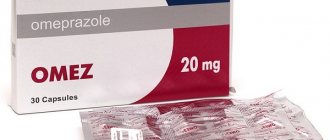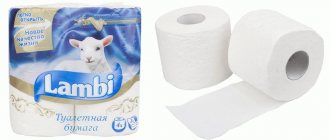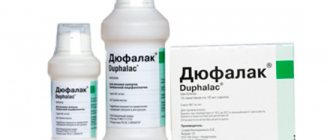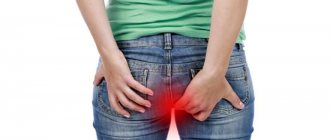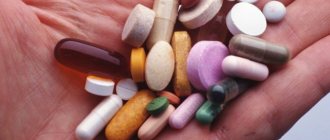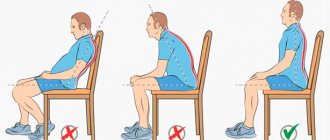Composition and properties
Per 100 milliliters of laxative there is:
- Lactulose (active ingredient) – 66.7 grams. It is a water-soluble white powder.
- Purified water (auxiliary component) – up to 100 milliliters. Does not contain dyes or fragrance additives.
Among the properties of the drug are the following:
- normalizes stool, relieves constipation,
- stimulates intestinal motility, causing the urge to defecate,
- is a prebiotic, that is, a nutrient medium for beneficial intestinal bacteria, stimulates their growth and suppresses the development of pathogenic microorganisms,
- eliminates dysbacteriosis,
- improves the absorption of phosphates and calcium salts,
- promotes the removal of ammonium ions.
Which laxative for hemorrhoids and after surgery is better and more effective?
Laxatives for hemorrhoids help avoid constipation and injury to the rectum. Various suppositories, drops and tablets gently cleanse the intestines and normalize its functioning during exacerbation of the disease. We will look at which drugs best help with hemorrhoids and what should guide your choice in this article.
Rectal suppositories promote the formation of soft feces and their painless movement through the intestines. With the use of a laxative, the process of defecation does not cause prolapse of the hemorrhoid and anal bleeding. The pharmacological market offers a large number of modern laxatives. When choosing a medicine, it is important to consider its safety, properties and duration of use.
Depending on their effect, all laxatives are divided into groups:
- annoying;
- osmotic;
- prebiotics;
- enteric fillers.
Irritating drugs are used for insufficient intestinal motility. Drops, tablets, and rectal suppositories are used for this purpose. The effect of the drugs is based on irritation of the walls of the rectum and stimulation of the muscles of the organ. The drug does not begin to act immediately - the effect occurs after 6-8 hours. It is not recommended to use medications in this group for longer than 10 days.
Osmotic agents retain fluid in the intestines and promote the formation of soft stools. The drugs are presented in pharmacies in the form of powders and suppositories. Defecation when using medications occurs quickly and painlessly.
Prebiotics are the best remedies for constipation. Available in the form of capsules, suppositories and powders. Restore intestinal microflora. Doctors recommend always using prebiotics in the treatment of hemorrhoids to facilitate the process of bowel movements. The drugs quickly cleanse the intestines, improve organ motility, and restore the microflora of the mucous membrane.
Intestinal fillers increase intestinal motility and are made from plant materials. Substances absorb water in the intestines, irritate the walls of the organ, and promote trouble-free bowel movements.
For hemorrhoids, it is recommended to use products with herbal ingredients that have a gentle and safe effect on the inflamed anal canal. Rectal suppositories with glycerin, powders, solutions and suspensions of safe action help well and provide quick defecation.
Glycerin suppositories
Rectal suppositories Glycerin is an effective laxative that provides quick positive results. The suppositories contain glycerin. After insertion into the anus, it begins to irritate the receptors of the anus. The feces soften, and the urge to defecate occurs.
Suppositories facilitate the passage of feces and normalize the peristalsis of the intestinal walls. Their use is recommended for patients with hemorrhoids of various stages.
The drug is contraindicated for use in:
- anal fissures;
- malignant intestinal tumor;
- individual intolerance.
Some side effects may develop:
- inflammation of the mucous membrane;
- diarrhea;
- discomfort in the anus.
Indications
The drug is prescribed for the following diseases:
- constipation of functional origin,
- defecation less than 3 times a week,
- haemorrhoids,
- anal canal fissures,
- hepatic encephalopathy,
- dysbacteriosis,
- enteritis (in the stage of bacterial carriage),
- putrefactive dyspepsia syndrome (in children) with acute food poisoning,
- rehabilitation after surgery on the intestines and anus (medicine is used to soften stool),
- preparation of the colon for diagnostic examination - sigmoidoscopy, irrigoscopy, colonoscopy.
A course of treatment
Duphalac is prescribed for oral administration during meals, diluted with water or undiluted. Moreover, it is advisable to immediately swallow the entire prescribed dose without delay in the oral cavity. The dosage and duration of treatment depends on the patient’s age, his individual characteristics, as well as the type and complexity of the pathology. As a rule, the positive effect of the medicine is felt already on the second day of use.
The syrup is drunk at the same time of the day, once (preferably in the morning) or by dividing the dose into 2 doses. The recommended daily amount is:
- for adults – 15-45 milliliters,
- for children 7-14 years old – 10-15 milliliters,
- for children from 3 to 6 years old – 5-10 milliliters,
- for children under 3 years old – up to 5 milliliters.
There are other features of taking the drug:
- For prevention purposes, a minimum dose is prescribed, which can also be taken once or divided into 2 times.
- When preparing the intestines for examination, take 100-150 milliliters per day.
- It is recommended to start therapy for hepatic encephalopathy with a daily dosage of 30-45 milliliters.
It is important that during treatment with Duphalac the patient drinks at least 1.5 liters of fluid per day.
Use of Lactulose for hemorrhoids
Hemorrhoids have several specific symptoms, which include: hemorrhoids, painful bowel movements, bleeding after bowel movements, blood in the stool, prolapse of nodes in the later stages of the disease.
Patients with hemorrhoids should not use enemas and suppositories, as they can injure the node, cause severe pain in the presence of cracks, and provoke bleeding due to a sharp stretching of the rectum.
Duphalac for hemorrhoids is a suitable laxative, since it does not provoke discomfort in the abdomen , does not cause the intestinal walls to get used to the medicinal substance, which prevents the development of “lazy bowel” syndrome, and gently softens the stool. When used in standard doses, Duphalac does not cause diarrhea. These properties of the drug fully comply with the requirements for prescribing laxatives during the treatment of hemorrhoids.
According to the instructions, for hemorrhoids, Duphalac is recommended for adults to drink in an initial dosage of 15-45 ml, and then the dose is reduced according to the nature of the stool. The only disadvantage of the medicine is bloating at the initial stage of treatment (the first 2 days). But this symptom is easily eliminated by prescribing Espumisan in therapeutic dosages.
After childbirth, nursing women are advised to take Duphalac when they have hemorrhoids. In the postpartum period, hemorrhoids are especially difficult, as the nodes hurt and bleed heavily. Duphalac has no effect on the baby during breastfeeding, as it is not absorbed in the intestines. If your baby experiences bloating while taking the medication, you can give Espumisan.
Contraindications
The drug is not prescribed for the following pathologies:
- intestinal obstruction or perforation of the gastrointestinal tract,
- galactose or fructose intolerance, glucose-galactose malabsorption or lactase deficiency,
- hypersensitivity to lactulose.
Use with caution in the following conditions:
- diabetes,
- rectal bleeding not associated with hemorrhoids,
- colostomy, ileostomy,
- hepatic encephalopathy.
For children
Duphalac is a safe treatment that is ideal for patients of all ages, starting from the first days of life. The drug is available in syrup form, so it is convenient to give it to a child.
To reduce the risk of side effects and to avoid increased gas formation, newborns are recommended to start a course of treatment with 1 milliliter per day, gradually increasing the daily dose to 5 milliliters. If desired, the medication is diluted with chilled boiled water or juice.
Analogs
According to active substance
Preparations in which the main active ingredient is lactulose:
- Bioflorax,
- Good luck,
- Depurax,
- Lactuvit,
- Lactulose,
- Normaze,
- Normolakt,
- Portalak,
- Romphalac.
According to the operating principle
The following drugs have similar laxative properties:
Guna Bovel
Active ingredients - aloe, alba breonia, collinsonia, buckthorn, dandelion, milk thistle, rhubarb, chilibuha, celandine, vitamins B1, B3, B5, D3, aluminum oxide, potassium carbonate, sodium carbonate and other components. A safe and effective homeopathic remedy, restores the balance of intestinal microflora, eliminates increased gas formation, constipation, and colon dysfunction. Used in the complex treatment of hemorrhoids.
Release form: drops for oral administration. The medicine is taken 15 minutes before meals, diluted in 1 tablespoon of water. Shake before use. The dosage depends on the patient’s age and the degree of complexity of the pathology. Adults and children over 12 years old are prescribed 10-15 drops 3 times a day, children 3-12 years old – 5 to 10 drops 3 times a day. The drug can be taken up to 5 times a day for 2 months.
Side effects: allergic reaction to the components of the drug, rashes, urticaria, itching.
Contraindications: individual intolerance.
Guttasil (Laxigal, Slabicap, Slabilen)
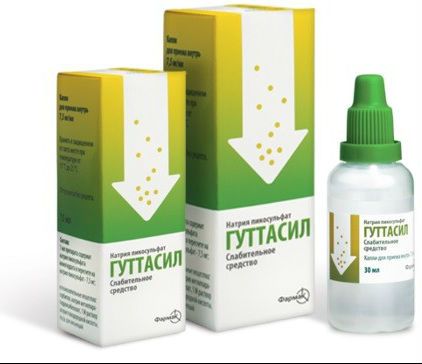
The active ingredient is sodium picosulfate. Prescribed for constipation or to facilitate the process of bowel movement in case of hemorrhoids, fissures in the anus, proctitis, preparation for surgery and diagnostic examination.
Release form: drops, tablets. The drug is taken orally before bedtime for morning bowel movements. Adults and children over 10 years old drink 13-27 drops, children from 4 to 10 years old take 7-13 drops, for children under 4 years old the dosage is selected at the rate of 2 drops per 3 kilograms of body weight. The product can be added to food.
Side effects are rare, but nausea, abdominal pain, flatulence, vomiting, diarrhea, loss of electrolytes (potassium, sodium), skin rashes, itching, headache, drowsiness, fatigue, and convulsions are possible.
Contraindications: hypersensitivity to the components of the drug, acute inflammatory process in the intestines or other abdominal organs, intestinal obstruction, the first 3 months of pregnancy, breastfeeding. Do not take daily or for long periods of time.
Constipation after hemorrhoid surgery: causes and complications, treatment, diet
After surgery to remove hemorrhoids, in most cases complications arise due to disturbances in peristalsis and bacterial balance in the intestines. Therefore, it is necessary to undergo a course of rehabilitation using both pharmacological drugs and traditional medicine. Compliance with the principles of dietary nutrition also underlies the normalization of rectal functions.
After surgery to remove hemorrhoids, in most cases complications arise due to disturbances in peristalsis and bacterial balance in the intestines.
Provoking factors for constipation after hemorrhoid surgery are:
- Pain syndrome. We are talking about the psychosomatic nature of problems with bowel movements. The patient wants to avoid the pain that has accompanied him for a long time due to hemorrhoids, so he retains feces on an unconscious level. There are often cases when patients do not feel the need to empty their bowels (there is no urge to defecate). And even after the enema, there is scant excretion of feces.
- Drugs with analgesic effect. For example, Morphine leads to bowel dysfunction after surgery, because the active substance of the drug slows down intestinal motility.
- A sedentary lifestyle, which is due to the need for bed rest after surgical treatment. Problems with emptying arise against the background of stagnant processes in the pelvic organs.
- Intestinal obstruction is a consequence of abdominal surgery. Additionally, the patient experiences vomiting, suffers from bloating, and experiences pain in the peritoneal area.
- Neglect of nutritional rules after surgery leads to problems with the normalization of digestive processes. There are a number of products that bind stool.
Constipation leads to the following complications:
- Violation of metabolic processes.
- Development of inflammation in the intestines. Hard feces lead to mechanical damage to the rectal mucosa, which may be accompanied by anal bleeding.
- The disease causes a lack of appetite.
- Sleep is disturbed.
- Poisoning of the body with toxic substances is observed.
- Enteritis may develop (impaired absorption of nutrients by the intestinal walls, atrophy of mucosal cells).
In most cases, topical medications (laxative suppositories) are prescribed. In severe cases of the disease, medications are used in tablet form (there are contraindications and side effects).
In most cases, for constipation after hemorrhoid surgery, topical medications (laxative suppositories) are prescribed.
The following treatment options for constipation are recommended:
